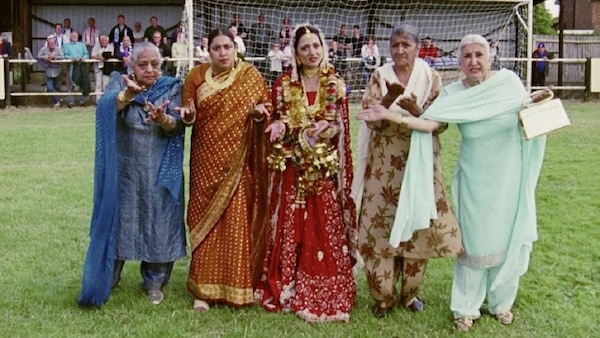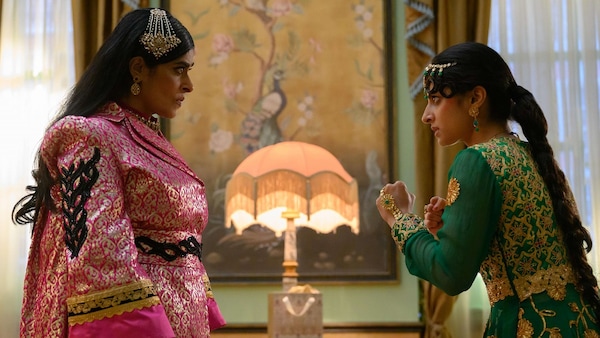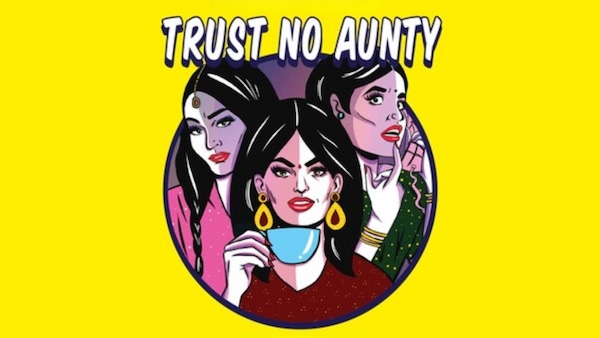Newsletter | From Monsoon Wedding To Polite Society, The NRI Auntie's Come A Long Way
The Evil Diaspora Auntie has been an established pop culture trope for some decades now. But in Nida Manzoor’s Polite Society, she emerges from the wings and onto centre stage, Manik Sharma writes.

Last Updated: 01.02 PM, May 01, 2023
This column was originally published as part of our newsletter Stream Of Consciousness on April 30, 2023. Subscribe here. (We're awesome about not spamming your inbox!)
***
AN NRI AUNT, among the cast of characters in Mira Nair’s Monsoon Wedding, coyly asks the bride-to-be, in one scene: “Kuch mahine aur nahi rukk sakte they? You know how difficult it is to get tickets this time of the year.”
It’s the kind of razor-sharp but honeyed jibe that Indian ‘Aunties’ are expected to deliver with élan — even in the foreground of a celebration. Their snappishness is far more sophisticated than some historic war strategies; they operate with the calculative stealth of a cheetah toying with its prey. The Evil Diaspora Auntie has been an established pop culture trope for some decades now. But in Nida Manzoor’s Polite Society, she emerges from the wings and onto centre stage. Finally, we have the denouement that previous diaspora-set stories have only hinted at. Twenty years since Monsoon Wedding, the gloves are off, and the bout is on.
Diaspora moms and aunties make for fascinating characters because they straddle the twin forces of modernity and tradition. Of all the Indians transitioning between their heritage and West-dictated futures, it’s possibly the moms, the women, who are burdened with carrying forward their homeland’s conservative language. It’s why the first scene of Gurinder Chadha’s Bhaji on The Beach features an NRI mom stumbling against stacks of a “western influence” — porn — as she is bombarded by images of all the gods and demons she worships and fears in equal measure. Guilt weighs almost all of these women down, to which they react by exacting caution. It’s why Bend it Like Beckham’s most iconic scene features Jess hallucinating about all her aunts and relatives being part of the defensive wall, as she prepares to take a free kick in a football match.

Morality is obviously at the heart of the Indian NRI Auntie’s many provocations. Freed of the homeland’s gravitational pull, they seek comfort and credibility amidst the liberal chaos of the West. First and second generation immigrants have continually played both sides of the tug-of-war between healthy restraint and reluctant liberalism. In Mindy Kaling’s Never Have I Ever, for example, Poorna Jagannathan plays the overcautious foil to her daughter’s desire to unhinge herself from the moral obsessions that have kept her mother cocooned. In Disney’s Ms Marvel, the conflict (in a Pakistani family) thus far at least has been without the challenges of adolescence. The template, however, looks and feels similar.
Most modern conceptions of the NRI Auntie are relatively kinder than Indian cinema’s early forays into diaspora-set stories. From the vamp in Pardes, to the raunchy mess in Kal Ho Na Ho, diaspora stories have matured to at least allow Indian-origin women an inner life. These women don’t simply echo shallow principles anymore, but contend with the difficulty of living in liberal countries with their own restrictive heritages. They are no longer in denial, or prudishly indignant about the obvious. They are cautious of the cultural nuance their identity demands. It’s not exactly diversity, but a carefully protected difference.

Morality and companionship obviously overlap in these stories. Marriage, therefore, is not just the setting but also the geometry that women must learn to navigate. To women without jobs, agency or a political voice of their own, who they marry and what kind of marriage they get to nurture, becomes key to both their sustenance and identity. Look beyond the barbs, and each Auntie’s petty swipe feels educated by the need to establish that geometry before it gets away from them. It’s bitterness spawned by a taste of the suffering that comes with playing second fiddle to men in foreign lands. Women fight for agency back home as well, but in a foreign landscape they possibly struggle to even scout outlets to scream into. “Why are you not getting married?” thus is a question loaded with not just restless intrigue, but also trained survivalist instinct. It’s possibly why this conflict is at its most intense between middle-aged women and their young subjects.
In Polite Society, the antagonist played by the stunning Nimra Bucha (exceptional in Zee’s Churails) becomes the symbol we’ve all been casually trained to suspect over the last three decades. Diaspora filmmakers have framed the NRI Auntie as the pesky occupant of a precipice that can neither be tamed nor truly unleashed. It’s the kind of combative personality almost everyone will eventually grow to dislike. There is obviously enormous scope still, to flesh out multi-dimensional characters. But for now Polite Society’s comic book version of this decades’ long conflict, with punches and martial arts thrown in, will allow the descendants of Bhaji On The Beach and Monsoon Wedding to finally have a fun slugfest. The kind of slugfest that is audaciously also contradicted by the one-way nonfiction storytelling that a Sima Aunty has now eked for herself via the endlessly awkward Indian Matchmaking.
What couldn’t kill the Auntie has, evidently, only made her stronger.
